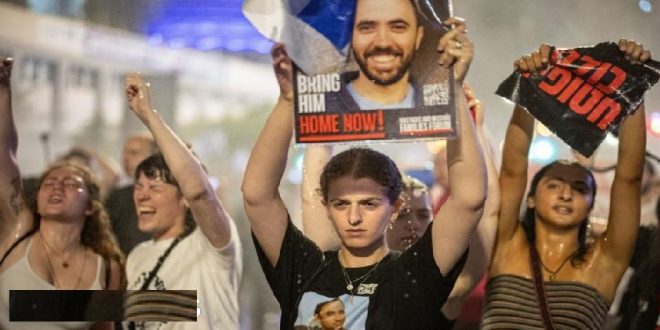11-06-2024
JERUSALEM: The dramatic rescue of four Israeli hostages in Gaza amid efforts to try to get Israel and Hamas to agree to a ceasefire has raised questions over the impact it could have on reaching a deal, as mediated talks show no sign of a breakthrough.
As images of the freed and smiling three men and one woman dominated TV bulletins and news websites, tens of thousands of people joined protests across Israel on Saturday, urging the government to strike an agreement with Hamas for the release of those who are still being held.
 “All of them, now!” the crowd chanted in Tel Aviv.
“All of them, now!” the crowd chanted in Tel Aviv.
Hamas meanwhile has called the operation, which its health ministry said killed more than 270 Palestinians, a “massacre”.
Being discussed is a three-stage plan announced by US President Joe Biden earlier this month, which he described as an Israeli proposal. It would secure the release of the hostages and, crucially, pave the way for a permanent ceasefire in Gaza.
Notably, the Israeli Prime Minister, Benjamin Netanyahu, has not openly endorsed the plan. It is not surprising, as he is facing pressure from multiple fronts and seems to be caught between two options: ceasefire or coalition.
The families of the hostages, whose ordeal has gripped the nation, and Israel’s international allies are calling for a deal.
From the people captured in October, 116 remain in captivity; more than a third of them have already been officially declared dead, a number that is probably higher.
Among those against the proposal, full details of which have not been made public, are two of Netanyahu’s far-right ministers, Itamar Ben-Gvir and Bezalel Smotrich.
They have threatened to quit the government if the deal goes ahead, which could lead to the collapse of the Netanyahu coalition.
“Temporarily in Israel there will be more pressure from certain quarters on Netanyahu to not do any deal, that we should continue to do rescue operations,” Gershon Baskin, who helped negotiated a deal with Hamas for the release of captured Israeli soldier Gilad Shalit in 2011, said.
 “Anyone who thinks logically and rationally knows that the only way to get [the] hostages home is through a negotiated deal.”
“Anyone who thinks logically and rationally knows that the only way to get [the] hostages home is through a negotiated deal.”
The resignation of Benny Gantz from the emergency government on Sunday is likely to result in more power to both Ben-Gvir and MSmotrich and, possibly, in more pressure from them on Netanyahu.
Described as a moderate, Gantz is considered a possible candidate to be the next prime minister. In Israel, much of the dispute over the current proposal is around the commitment to a permanent cessation of hostilities in other words, the end of the war. Netanyahu has insisted Israel will not accept any plan before the destruction of Hamas’s military and governing capabilities, a choice of words that is vague enough to leave his options open. “I believe that Netanyahu prefers his coalition over bringing our boys and girls home,” said Michael Hauser Tov, chief political correspondent at the Haaretz newspaper, which is critical of the prime minister.
This is a common suspicion in Israel and elsewhere: that Netanyahu is interested in prolonging the war for his own political survival.
“I think Netanyahu will try to continue with the negotiations only for his international needs and the relationship with President Biden and, on the other hand, he’ll try to sabotage the negotiations because he wants to keep his coalition stable.”
Hamas has not yet given a formal response to the plan outlined by President Biden. One of its key demands is a guarantee that the Israeli military will not resume its offensive against the group once the hostages are released. (Int’l News Desk)
 Pressmediaofindia
Pressmediaofindia




